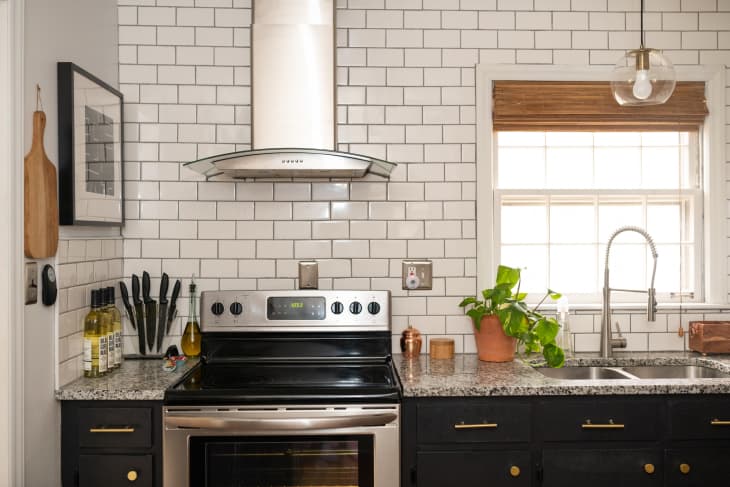Everything You Need to Know About Granite Countertops

Choosing countertops is no simple task. When it comes to materials, there are plenty of options—each with their own set of pros and cons. And, because it’s a rather permanent decision with a lofty price tag, there’s a lot of pressure to get it right. With that in mind, we asked two industry experts to anticipate all of your most pressing questions about granite, so you can feel good about pulling the trigger on the purchase.
What is granite?
First things first: “True granite is a type of igneous rock which is mainly composed of the minerals quartz and feldspar,” says Henry Hernandez of Builders Surplus. That mix of materials gives granite its trademark speckled appearance, and also means that granite can have a range of different finishes—from creamy white to deep black to speckled gray and even bright blue and salmon-y pink.
What are the pros of granite countertops?
“Granite is generally considered a durable stone—it’s very dense and acid-resistant,” says Nancy Epstein, founder and CEO of Artistic Tile. The density means it’s far less likely to scratch than softer stones (such as marble or soapstone), and it’s less likely to stain, too. However, that doesn’t mean it’s stain-resistant.
What are the drawbacks of granite countertops?
Granite is susceptible to staining if not sealed, and care should be taken with acidic foods and beverages. One other major drawback, according to Epstein? Finding slabs that feel 2019 and not 1999. “It’s unusual to find a granite that feels aesthetically fresh,” she says. That doesn’t mean they’re unavailable, but you might have to hunt a little deeper to source them.
What is the average price for granite countertops?
“Like many stones, the sourcing location and cut of the granite affects the pricing considerably,” says Hernandez. That said, a good ballpark figure is about $40 per square foot—and sometimes sales can bring the pricing down to as little as $27 per square foot, he says. For more exotic varieties, expect to pay as much as $200 or more per square foot, says Epstein.
What should you consider when selecting a granite slab for your countertops?
It may sound obvious, but when selecting a stone, make sure you like the look of it. “The largest part of this decision is aesthetic,” says Epstein. “No matter what countertop you install, you’re going to need to care for it and live with it. You should choose the slab you like most.” Some granite slabs have more “movement”—or natural pattern—than others, so take time to consider what style suits your kitchen or bathroom.
Once you settle on the right aesthetic, make sure the slab you select isn’t cracked or filled excessively, she says, both of which cause structural weaknesses that lead to future problems.
Do you need to seal granite countertops?
Yes, you should. “Granite, like all natural stones, should be sealed to prevent staining or etching,” says Epstein. The more porous the stone, the more susceptible it is to staining; marble and limestone are both very porous, while quartz is non-porous. Granite is somewhere in the middle. Regularly sealing it will help prevent stains from settling in.
What’s the best way to keep granite countertops in good condition?
Though most granite is easy to clean, some granite countertops—especially those without sealant—can stain and absorb harmful bacteria, says Hernandez. “I recommend purchasing a cleaner designed specifically for granite, but if you can’t find one, any pH-neutral soap will be just fine for daily cleaning,” he says. “It’s critical to stay away from cleaners that contain too many chemicals or vinegar, as they have the ability to rub away the protective sealant added during manufacturing.”
And if spills happen (they will!), sop them up as soon as possible to prevent lasting damage. You can also use a more powerful mixture of baking soda and hydrogen peroxide to remove oil, juice, and alcohol marks without harming the stone, says Hernandez.
Most of all, don’t stress over your countertops, says Epstein. “Natural materials don’t all look identical to one another and don’t remain factory-perfect over the course of their lifetimes—and they’re better for it.”